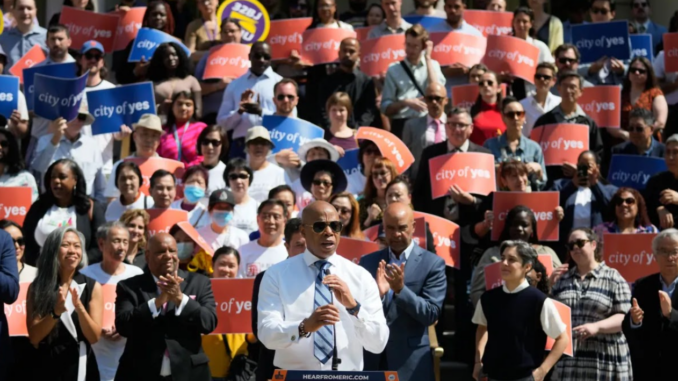
By Paulina Gajewski
Amidst Mayor Eric Adams, facing a criminal indictment, as previously reported by The Vanguard, his administration has continued to implement efforts to improve NYC’s quality of life for its citizens.
The most recent of the proposals, the Congestion Pricing Program, plans to fund the Metropolitan Transit Authority (MTA) and reduce air pollution by charging drivers a toll who are entering Manhattan south of Central Park. The program, which had been decades long in the making and was stalled on June 30, will be revived on Jan. 5, as previously reported by The Vanguard. The initial $15 fee for vehicles was decreased to $9 by Governor Kathy Hochul amid the high cost of living following the COVID-19 pandemic.
The program’s first purpose is to reduce traffic and air pollution on NYC streets. The amassed funds will then be used to fund the struggling transit system, which lends itself to the second purpose of the program. This includes funding the Interborough Express, a project that intends to provide greater transit access between Brooklyn and Queens, as previously reported by The Vanguard.
The program is still in need of federal approval, which Governor Kathy Hochul hopes to receive before the Biden administration leaves office, as the President-elect Donald Trump vehemently opposes the proposal.
“It has never worked, but especially so with a city, town, or village that is trying to come back from very rough times, which can certainly be said of New York City. It will put New York City at a disadvantage over competing cities and states, and businesses will flee,” Trump told the New York Post on Nov. 13.
Renters in NYC are often burdened by heaping costs in addition to rent, including a security deposit, credit reports fees, and the brokerage fee. Landlords hire brokers to list and show their available apartments for rent, and tenants are often left to pay the brokerage fee, which could amount to $1000 at least. According to rental listing data gathered by StreetEasy, “the average upfront cost to move into a rental was $10,454 in 2023, up 29% from 2019 before the pandemic disrupted the market.”
As of Nov. 13, NYC Council passed Introduction 360-A, also known as Fairness in Apartment Rental Expenses (FARE) Act, which would prevent landlords from passing the brokerage fees onto their tenants. This act is part of the effort to alleviate the financial burdens of living in NYC.
Along with rising costs of living, the demand for and the supply of housing has become disproportionately mismatched. NYC has attracted and retained its residents at a higher rate, but the private marketplace has not produced enough housing to match this increase in demand, as per NYC Housing.
In order to address this housing crisis, Mayor Eric Adams addressed the city’s zoning rules in the third part of his plan known as the “City of Yes,” first proposed on Dec. 8, 2022, according to the Office of Mayor Adams. On Nov. 21, the plan was approved by the City Council, along with a $5 billion boost for affordable housing and infrastructure projects across NYC.
“This housing crisis has been going on for so long that some take it as a fact of life that New York City is a place where rents always go up and where housing is always hard to find, but that is a policy choice,” Daniel Garodnick, the director of the Department of City Planning, said at a rally in April. “We don’t have to live this way.”
The plan has several proposals, including, “ending parking mandates for new housing in some neighborhoods; allowing units such as backyard cottages and basement apartments; and adding housing above businesses on commercial streets in low-density areas,” according to The New York Times. The plan will move on to a full Council vote on Dec. 5.
Dense housing areas often accumulate trash bags along sidewalks leading up to trash pickup day. As a solution, new rules regarding sanitation have been proposed and are beginning to come into effect.
Starting Nov. 12, “all properties with 1-9 residential units must use bins, 55 gallons or less, with secure lids for trash set out,” as stated on the NYC Sanitation page. A warning period will be in effect until Jan. 2, 2025, and residents who do not comply with proper usage of trash bins will be fined. In June 2026, properties with 1-9 residential units must use the official NYC Bin for trash, which will be purchased via online order and also available in every Home Depot in NYC.
These recent policy proposals represent a shift in consensus amongst city officials, and the view that the current economic situation in the city is unsustainable and proactive measures had to be taken to improve the lives of those that reside in the city.
“As we make these common-sense reforms, the real winners are everyday New Yorkers,” said Deputy Mayor for Operations Meera Joshi according to nyc.gov. “The old system of announcing a project — and then waiting years upon years — is finally a thing of the past.”
